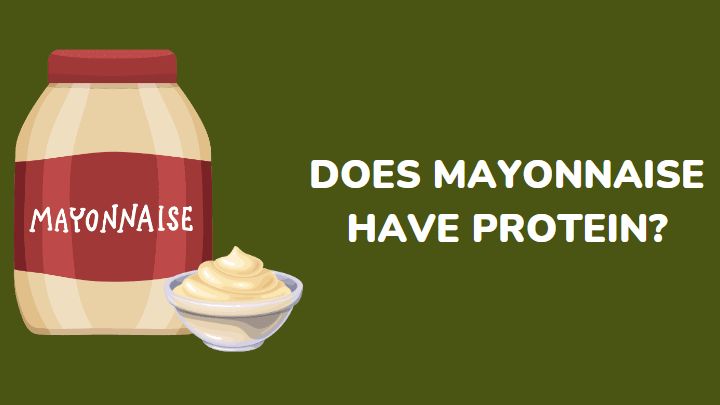Do you want to know if mayonnaise should make part of your protein diet? Then, you should read this article.
Yes, mayonnaise contains protein, however, there are only about 2.1 grams of protein in a cup of mayonnaise, which is a very small amount.
Furthermore, mayonnaise is considered to be a very good source of calories, fat, sodium, and other nutrients.
In this article, I will briefly describe mayonnaise for some who may not know what it is, explore its nutrients and benefits, and provide some other useful information you may be seeing for the first time.
So, let’s dive right in.
What is mayonnaise?
Mayonnaise is a thick, cold, and creamy sauce that is often used on sandwiches, hamburgers, salads, and French fries.
Also, it is mostly used as a foundation for a variety of other sauces, including tartar sauce, fry sauce, remoulade, salsa golf, and rouille.
Mayonnaise is made by emulsifying (the process of mixing two or more normally incompatible liquids) eggs, oil, lemon juice, or vinegar.
Why does mayonnaise lack a lot of protein?
Even though mayonnaise is made with egg yolks, which are high in protein, the egg-to-oil ratio makes it low in protein overall.
While egg yolks, at roughly 16.4 grams of protein per 100 grams, are a good source of protein, the recipes call for far more oil than egg yolks during emulsification.
As a result, the final protein level of mayonnaise is low because the protein component of the egg yolk is stretched out.
Mayonnaise calories and nutrition
100 grams of mayonnaise has the following nutrients:
| Calories | 680 |
| Total fat | 75gm |
| Saturated fat | 12gm |
| Cholesterol | 42 gm |
| Sodium | 635 mg |
| Potassium | 20 mg |
| Iron | 1% |
| Cobalamin | 1% |
What are other mayonnaise substitutes with more protein?
If you are looking for a suitable substitute for mayonnaise with proteins, you can go for any of the following:
Greek yogurt
Greek yogurt, also known as strained or thick yogurt, is a white yogurt that is thick and creamy like mayonnaise but has ten grams of protein per tablespoon.
However, Greek yogurt has a milder flavor than mayonnaise and looks more like sour cream.
Hence, Greek yogurt is better than mayonnaise as a dressing or sauce for egg salads, potato salads, and other similar dishes.
Hummus
Despite its grainier texture, hummus can be used in place of mayonnaise in sandwiches and contains about 1.2 grams of protein in a tablespoon.
However, hummus may not be the best choice for salads that call for a mayonnaise dressing or sauce, but it is a great substitute for mayonnaise when used as a spread for sandwiches and wraps.
Avocado
Avocado contains around 2 grams of protein in a tablespoon, and can as well serve as a substitute for mayonnaise, especially when you need something with the same creamy and thick consistency.
However, avocado has a somewhat more unique flavor than mayonnaise, which makes it impossible to get the same mayonnaise-like taste from it.
Is mayonnaise vegan?
No, mayonnaise is not vegan because it is made with eggs.
However, you can replace the egg with aquafaba, a thick liquid obtained from cooking or soaking chickpeas to make your mayonnaise vegan-friendly.
Is mayonnaise keto-friendly?
Yes, mayonnaise is keto-friendly.
Mayonnaise contains almost no carbs and a lot of fat. So, it is okay to add mayonnaise to your meat, vegetables, and other keto-friendly diets to make them taste better.
Does mayonnaise cause weight gain?
Yes, eating a lot of mayonnaise can aid weight gain. This is because, mayonnaise is of the highest-fat and highest-calorie condiments available, which can cause you to gain weight.
However, if consumed moderately, you will barely notice a change in your weight.
What are other types of mayonnaise flavors?
Mayonnaise comes in numerous varieties, which means there is a type of mayonnaise for every taste and need.
However, the fact that mayonnaise is flavorless and a must-have in any kitchen is its greatest asset.
Mayonnaise’s flavor profile can be expanded by experimenting with different additions, and it can then be used in a wider variety of foods.
Here is a list of the most common, tasty, and easy-to-make mayonnaise flavors that you can make with homemade ingredients:
- Spicy mayonnaise
- Lime mayonnaise
- Citrus and honey mayonnaise
- BBQ mayonnaise
- Ouzo mayonnaise
- Chimichurri mayonnaise
- Chipotle mayonnaise
- Sesame mayonnaise
- Harissa mayonnaise
- Korean mayonnaise
- Wattle seed mayonnaise
- Sriracha mayonnaise
- Herbed Mayonnaise
FAQs
Is mayonnaise healthy?
Yes, it is.
Mayonnaise contains a lot of vitamin E which helps to keep hearts healthy and functioning. Also, it reduces the risk of stroke.
Are there negative effects of consuming too much mayonnaise?
Yes, there are. You may feel weak, queasy, or have headaches from consuming excessive mayonnaise.
Should you eat mayonnaise every day?
Eating mayonnaise every day isn’t a very healthy choice. Overconsumption of mayonnaise may increase the risk of cardiovascular disease.
What does mayonnaise taste like?
Mayonnaise has a similar taste to sour cream, pesto sauce, and Greek yogurt.
Butter or mayonnaise: which is healthier?
Mayonnaise is a healthier choice because it contains less saturated fat than butter.
Conclusion
Mayonnaise contains protein, even though it contains less than 0.1 grams of protein per tablespoon, making it a poor source of protein.
Mayonnaise is very versatile and can be used in a variety of dishes, like coleslaw, potato salad, lamb sauce, chicken burgers, and so on.
However, it is not optimal for both weight loss and weight gain, moderate consumption will not significantly influence the weight of most people.
I hope you found this article helpful. Thank you for reading.
You can find more resourceful articles like this on Millenora.

